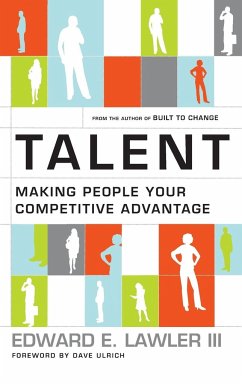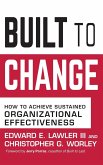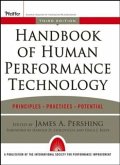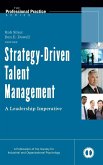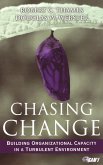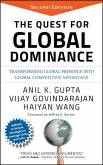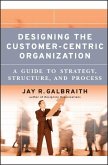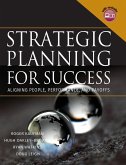Praise for Talent
"Ed Lawler, a pioneer in unveiling the importance of human capital, shows how top-performing companies make people their competitive advantage and challenges us all to take current best practices to the next level."
-Bob Eckert, chairman and CEO, Mattel, Inc.
"Ed Lawler's operative phrase, 'obsessed with talent,' is the cornerstone of this book. When competitive improvement demands differentiation via human endeavors in technology, innovation, and service, individuals and collective talent deliver results. There is art and science to having the right talent at the right time for any and all circumstances. Ed has articulated the mindset, methodologies, and practices that ensure success."
-John D. Hofmeister, president, Shell Oil Company
"Lawler's Talent is a must-read. It shows how to develop leaders at all levels who are smarter and more competitive every day. He provides us with a practical guide to building human-centric, winning organizations."
-Noel Tichy, coauthor (with Warren Bennis) of Judgment: How Winning Leaders Make Great Calls, and professor, Ross School of Business, the University of Michigan
"Talent does a terrific job of examining the fundamental question about human capital-centric organizations: Do highly talented people build highly effective organizations, or vice versa? This book shows us why the answer is 'yes' and 'yes'!"
-Ian Ziskin, corporate vice president, and chief human resource and administrative officer, Northrupp Grumman Corporation
"Ed Lawler, a pioneer in unveiling the importance of human capital, shows how top-performing companies make people their competitive advantage and challenges us all to take current best practices to the next level."
-Bob Eckert, chairman and CEO, Mattel, Inc.
"Ed Lawler's operative phrase, 'obsessed with talent,' is the cornerstone of this book. When competitive improvement demands differentiation via human endeavors in technology, innovation, and service, individuals and collective talent deliver results. There is art and science to having the right talent at the right time for any and all circumstances. Ed has articulated the mindset, methodologies, and practices that ensure success."
-John D. Hofmeister, president, Shell Oil Company
"Lawler's Talent is a must-read. It shows how to develop leaders at all levels who are smarter and more competitive every day. He provides us with a practical guide to building human-centric, winning organizations."
-Noel Tichy, coauthor (with Warren Bennis) of Judgment: How Winning Leaders Make Great Calls, and professor, Ross School of Business, the University of Michigan
"Talent does a terrific job of examining the fundamental question about human capital-centric organizations: Do highly talented people build highly effective organizations, or vice versa? This book shows us why the answer is 'yes' and 'yes'!"
-Ian Ziskin, corporate vice president, and chief human resource and administrative officer, Northrupp Grumman Corporation
"Some boards do have committees on human resources, but they typically focus on CEO and executive compensation and perhaps succession planning at the executive level, not on the overall talent strategy and effectiveness of the organization...What is needed is a human capital committee that addresses succession planning for senior management positions and the evaluation of the CEO and the top management team."--as excerpted from TALENT by Edward E. Lawler, III in Directors & Boards "There was one chapter in Talent that I found to be really new and interesting. That was the chapter about corporate boards and talent management. Often when we think about boards of directors we think about a room of former CEOs and finance guys who go over number and compliance issues. That's pretty much what Lawler has found in his research as well. But if a company wants to really use its people as its competitive advantage, then these boards of directors have to be informed on the talent management issues within the company. Not only that, but at least some of these board members should have some HR expertise--which according to Lawler's research, is a pretty rare occurrence."--Workforce Management "In his book--for those who wish to proceed with HC-centricity--Lawler describes the steps involved in building talent-based organizations. Through generous case studies of companies from Whole Foods to BMW to Siebel Systems, Lawler outlines ways of achieving HC-centric management through approaches he labels 'high involvement' or 'global competitor."--HR Magazine "Lawler presents visionary information and examples that any organization can take pieces from. As a whole, Talent is a thought-provoking read. More importantly it is a practical book. Anytime the reader starts to say to him or herself "yeah right, that would never work" Lawler responds with an acknowledgment of the practicalities and support for optimism. If Lawler's prediction that more companies will turn towards HC-centric organizations then it would be wise to read this book now." --The Employment File, 6/10/2008
Voted "Best Book of 2008" in Human Capital, Strategy + Business "Some boards do have committees on human resources, but they typically focus on CEO and executive compensation and perhaps succession planning at the executive level, not on the overall talent strategy and effectiveness of the organization...What is needed is a human capital committee that addresses succession planning for senior management positions and the evaluation of the CEO and the top management team."--as excerpted from TALENT by Edward E. Lawler, III in Directors & Boards
"There was one chapter in Talent that I found to be really new and interesting. That was the chapter about corporate boards and talent management. Often when we think about boards of directors we think about a room of former CEOs and finance guys who go over number and compliance issues. That's pretty much what Lawler has found in his research as well. But if a company wants to really use its people as its competitive advantage, then these boards of directors have to be informed on the talent management issues within the company. Not only that, but at least some of these board members should have some HR expertise--which according to Lawler's research, is a pretty rare occurrence."--Workforce Management
"In his book--for those who wish to proceed with HC-centricity--Lawler describes the steps involved in building talent-based organizations. Through generous case studies of companies from Whole Foods to BMW to Siebel Systems, Lawler outlines ways of achieving HC-centric management through approaches he labels 'high involvement' or 'global competitor."--HR Magazine
"Lawler presents visionary information and examples that any organization can take pieces from. As a whole, Talent is a thought-provoking read. More importantly it is a practical book. Anytime the reader starts to say to him or herself "yeah right, that would never work" Lawler responds with an acknowledgment of the practicalities and support for optimism. If Lawler's prediction that more companies will turn towards HC-centric organizations then it would be wise to read this book now." --The Employment File, 6/10/2008
"A lot of people know a little about Talent. Ed Lawler knows a lot! In fact, he may know more about this topic than anyone I know!"
"There is no better person to provide advice on Talent than Ed Lawler!"
"The world's authority on HR systems - he shows you how to change the people equation in your company!" - Marshall Goldsmith is the New York Times best selling author of What Got You Here Won't Get You There - the Harold Longman Award Best Business Book of 2007.
"There was one chapter in Talent that I found to be really new and interesting. That was the chapter about corporate boards and talent management. Often when we think about boards of directors we think about a room of former CEOs and finance guys who go over number and compliance issues. That's pretty much what Lawler has found in his research as well. But if a company wants to really use its people as its competitive advantage, then these boards of directors have to be informed on the talent management issues within the company. Not only that, but at least some of these board members should have some HR expertise--which according to Lawler's research, is a pretty rare occurrence."--Workforce Management
"In his book--for those who wish to proceed with HC-centricity--Lawler describes the steps involved in building talent-based organizations. Through generous case studies of companies from Whole Foods to BMW to Siebel Systems, Lawler outlines ways of achieving HC-centric management through approaches he labels 'high involvement' or 'global competitor."--HR Magazine
"Lawler presents visionary information and examples that any organization can take pieces from. As a whole, Talent is a thought-provoking read. More importantly it is a practical book. Anytime the reader starts to say to him or herself "yeah right, that would never work" Lawler responds with an acknowledgment of the practicalities and support for optimism. If Lawler's prediction that more companies will turn towards HC-centric organizations then it would be wise to read this book now." --The Employment File, 6/10/2008
"A lot of people know a little about Talent. Ed Lawler knows a lot! In fact, he may know more about this topic than anyone I know!"
"There is no better person to provide advice on Talent than Ed Lawler!"
"The world's authority on HR systems - he shows you how to change the people equation in your company!" - Marshall Goldsmith is the New York Times best selling author of What Got You Here Won't Get You There - the Harold Longman Award Best Business Book of 2007.

